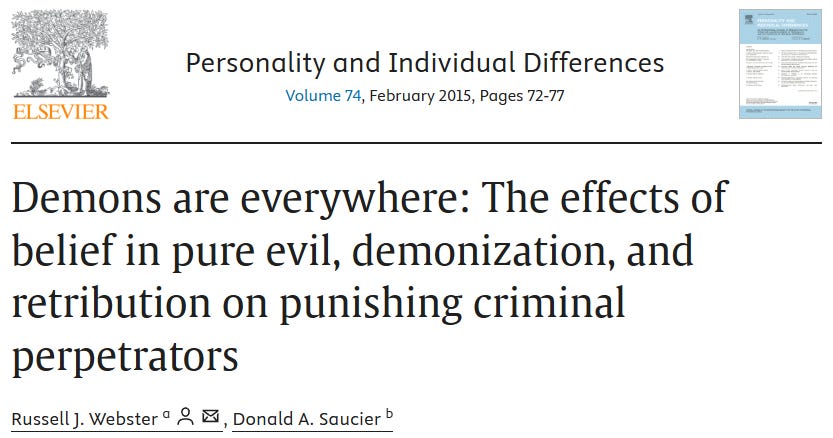How Moral Judgement Contributes to Violence and Human Atrocities
Blaming Evil and demonizing offenders decontextualizes and over-simplifies human behavior reducing intelligent examination and meaningful solutions for important issues like violence and crime.
Image credit: Inmates housed in a gymnasium due to overcrowding at the California Institution for Men state prison in Chino, California, 2011. (Lucy Nicholson / Reuters)
The simplistic belief in evil as an explanation for human behaviours like crime and violence and the demonization of those who live differently from us, disagree with us or hold incompatible belief systems are powerful forces that drive human division and conflict. These psychological and social phenomena reduce complex realities into black-and-white narratives, protecting the status quo while fostering misunderstanding, hatred, and violence.
Here’s an exploration of how this dynamic unfolds and its consequences:
Evil, Demonization, and Moral Judgement
Demonization is the act of portraying an individual, group, or idea as inherently evil, malicious, or dangerous. This identification offers psychological simplification and comfort in hard-to-comprehend events by overlooking complex contexts and reducing motivations, behaviours, and cultural differences into a singular label of “evil.”
It creates a false dichotomy that divides humanity into opposing camps, pitting one group (the “good”) against another (the “evil”) in a manner that prevents intelligent discourse and the discovery of meaningful solutions. It frames conflicts as battles between good and evil, justifying actions that might otherwise be seen as unethical.
The belief in evil as an innate characteristic of criminals simplifies the world at the cost of intelligent investigation, understanding and meaningful solutions. It contributes to division and conflict through cognitive bias as we are inclined to see our group as virtuous and others as fundamentally flawed. Labelling criminals or those different from us “evil” strips them of dignity and their humanity, making it easier to justify mistreatment, exclusion, or violent brutality.
Conflict Escalation
Demonization hardens group identities, intensifying polarization and making dialogue or compromise nearly impossible in a manner that drives escalation. Viewing the other side as irredeemably evil legitimizes extreme responses, such as persecution, systemic discrimination, violent acts and atrocities like genocide. Further complicating this, social media can be weaponized to amplify this dynamic by creating echo chambers where disinformation and simplistic narratives thrive. Injustice often results as one group feels morally justified in oppressing or eliminating the perceived “evil.”
Historical Examples
Witch Hunts: During the Salem Witch Trials, fear and suspicion led to the demonization of innocent people.
Genocides: Demonization has fueled atrocities, such as the Holocaust, where an entire group was labelled as inherently evil and dangerous.
Modern Politics: Political opponents are often portrayed as existential threats, undermining democratic discourse.
The Psychological Appeal of Moral Judgement
Psychological theories suggest that seeing evil in others can result from projecting unresolved fears or discomfort with the darker aspects of one’s own psyche onto others. This allows us to avoid these aspects of ourselves in a manner that provides comfort and allows us to act on them without acceptance or accountability.
Complex social problems like economic inequality, class division, or cultural tensions are easier to process and live with when blamed on a dehumanized individual or group. Seeing oneself as part of the “good” affirms an acceptable identity, reinforcing group belonging and self-righteousness. Blaming external “evil” allows individuals or groups to avoid accepting responsibility for the harm they have caused, posing a threat to the status quo, or engaging in the uncomfortable shadowwork necessary for positive change.
Consequences of Moral Judgement
For individuals, constant exposure to narratives of evil fosters paranoia and mistrust. Demonizing others makes it harder to understand their perspective, reducing opportunities for connection, compassion and empathy. For society, demonization of the other contributes to a breakdown of dialogue, shutting down meaningful conversations and preventing problem-solving and reconciliation. Where the use of moral judgement and demonization is weaponized and abused by a third-party power, it can contribute to social fragmentation as communities and nations become divided, weakening social cohesion and trust in a manner that leaves everyone vulnerable to the will of the powerful.
Moving Beyond Moral Judgement
Solving complex social issues like violence and crime requires us to recognize and appreciate complexity and context intelligently, foster empathy, encourage dialogue and think critically.
Human motivations are multifaceted and shaped by culture, history, and unique lived experiences. Understanding this provides a foundation for communication and connection and reduces the temptation to label others as purely evil.
Fostering empathy challenges simplistic beliefs by encouraging people to see others as individuals rather than caricatures.
Encouraging dialogue creates spaces for open conversation that can dissolve stereotypes and reveal shared humanity.
Critical thinking allows us to resist propaganda and simplistic narratives, encouraging people to question black-and-white portrayals of conflict.
Finally, replacing adversarial with restorative modes of justice addresses wrongdoing with a focus on healing and accountability that prioritizes social balance and collective well-being rather than a focus on punishment and revenge, which prioritizes profitability and protecting the status quo.
Insights from Psychology and Philosophy
Hannah Arendt’s “Banality of Evil”: Arendt’s analysis of Adolf Eichmann revealed that evil often arises not from inherent malice but from thoughtlessness and conformity.
Carl Jung’s “Shadow Work”: Jung emphasized the need to confront one’s “shadow” (the darker parts of oneself) to avoid projecting these qualities onto others.
Mahatma Gandhi’s “Satyagraha” (Truth Force): Gandhi’s philosophy of nonviolence and “seeing the humanity in the oppressor” challenges demonization and advocates for reconciliation.
Conclusion
The tendency to demonize and believe in evil as a simplistic explanation for human behaviour is an understandable but dangerous psychological shortcut. It drives division and conflict by dehumanizing others and justifying harm. Overcoming this tendency requires empathy, dialogue, and a commitment to seeing others in their full complexity. By rejecting moral judgment and embracing intelligent discourse, societies can foster unity, understanding, and peace.



